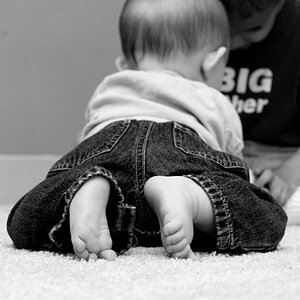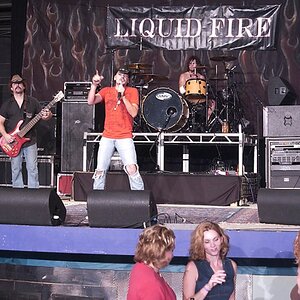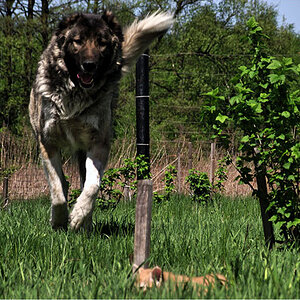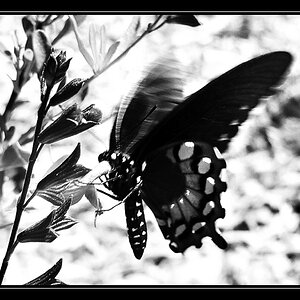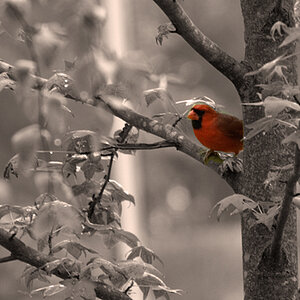dpolston
TPF Noob!
- Joined
- Apr 8, 2007
- Messages
- 949
- Reaction score
- 1
- Location
- Norfolk, VA.
- Can others edit my Photos
- Photos OK to edit
I have been playing around with this photography "business" dream for awhile and I think that I am trying to fast track myself into the business. I am a 38 year old father of 2, self employed, building contractor. I am trying to promote this part of my life like the rest which is very much purely self driven successes and failures. I have the website ready to be officially launched, I have the blog, I have the portfolio, the camera and the goodies that go with it (although I need a good dedicated flash), I am however not in the position to blindly start all over again in this stage of life.
It seems like a lifetime ago (early 90's), I worked full time as a studio photographer that shot female portraits (formals to high heals and a smile). It was an established studio that had very nice equipment but it was already dialed in when I got there. The lights were set, the camera (Mamiya C330's) were mounted and the hardest thing we did was try to be somewhat creative in a generic, 6 light, 3 photographer studio. "Advanced Glamor Shots".
Now I look at so many websites of you guys and see and hear of the travels, money, good and bad experiences, equipment and stories you tell. I am amazed and envious every day of some shot you've taken, client you have or studio you've set up and I know that a successful business can be achieved.
My inner struggle is getting back to the basics and re-learning photography 101 techniques. I should brush up on real basics (exposer, f-stop stuff, etc.) but what I really want to know is if I need to be asking about working as an assistant for someone locally. Frankly sometimes I just want to throw all my cameras away and say forget it all. Why do I need a camera that costs 1600 bucks and a lens that cost me 1000 bucks to take snapshots of "leaves on my driveway" ( http://davidpolston.blogspot.com/2007/10/feaf-prints.html )
I am at the point of bugging one of my photo idols ( http://www.lanpher.com/ ) that I have emailed and spoken with on the phone, but I don't want to push it so that I irritate him. I'm just looking for "real world" advice. I'm just looking to take him to lunch and pick his brain for a bit.
So... to the point of this. How do you as "professionals" really feel about newcomers in the business? Are we a threat to you, gonna take your business, do we just have too many shooters out there? Are you really willing to teach someone your lifestyle? How hard is it really to get your name out there?
Please don't patronize me when you answer this post. I am in the same spot you were in once upon a time. I have found something that I want to do professionally, full time, and I need to know how to get there.
Do I need to market myself better, pick a "poison"; specialize ("senior portraits", theater shots", "building exteriors")? Look at the photos I have, just tell me if I suck or what I need to work on! I need to know. www.davidpolston.com/flash.html (this is the back door link. I know there are some typo's, this is my web guru's almost ready to post;yet still rough draft of the site.)
It seems like a lifetime ago (early 90's), I worked full time as a studio photographer that shot female portraits (formals to high heals and a smile). It was an established studio that had very nice equipment but it was already dialed in when I got there. The lights were set, the camera (Mamiya C330's) were mounted and the hardest thing we did was try to be somewhat creative in a generic, 6 light, 3 photographer studio. "Advanced Glamor Shots".
Now I look at so many websites of you guys and see and hear of the travels, money, good and bad experiences, equipment and stories you tell. I am amazed and envious every day of some shot you've taken, client you have or studio you've set up and I know that a successful business can be achieved.
My inner struggle is getting back to the basics and re-learning photography 101 techniques. I should brush up on real basics (exposer, f-stop stuff, etc.) but what I really want to know is if I need to be asking about working as an assistant for someone locally. Frankly sometimes I just want to throw all my cameras away and say forget it all. Why do I need a camera that costs 1600 bucks and a lens that cost me 1000 bucks to take snapshots of "leaves on my driveway" ( http://davidpolston.blogspot.com/2007/10/feaf-prints.html )
I am at the point of bugging one of my photo idols ( http://www.lanpher.com/ ) that I have emailed and spoken with on the phone, but I don't want to push it so that I irritate him. I'm just looking for "real world" advice. I'm just looking to take him to lunch and pick his brain for a bit.
So... to the point of this. How do you as "professionals" really feel about newcomers in the business? Are we a threat to you, gonna take your business, do we just have too many shooters out there? Are you really willing to teach someone your lifestyle? How hard is it really to get your name out there?
Please don't patronize me when you answer this post. I am in the same spot you were in once upon a time. I have found something that I want to do professionally, full time, and I need to know how to get there.
Do I need to market myself better, pick a "poison"; specialize ("senior portraits", theater shots", "building exteriors")? Look at the photos I have, just tell me if I suck or what I need to work on! I need to know. www.davidpolston.com/flash.html (this is the back door link. I know there are some typo's, this is my web guru's almost ready to post;yet still rough draft of the site.)



![[No title]](/data/xfmg/thumbnail/41/41761-8ca3fbaa811d0935e3ce369aaf34fdd8.jpg?1619739884)


![[No title]](/data/xfmg/thumbnail/32/32708-c55da623febe9d91efe5f28aa54c3090.jpg?1619735612)
